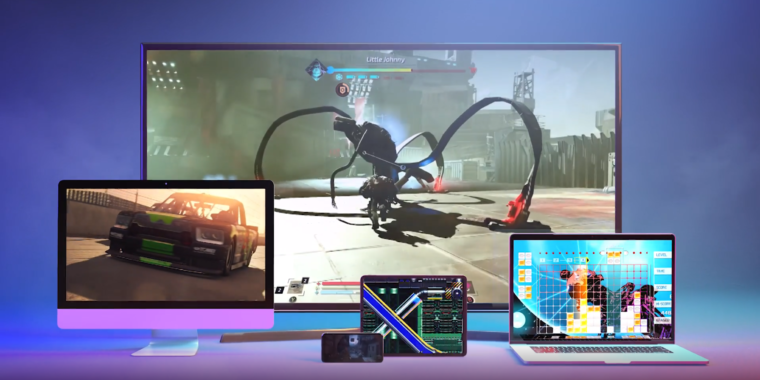
-
The now-standard streaming-game-service shot of titles running on many different kinds of screens.
-
Here’s all those screens running Metro Exodus.
-
Just some of the streaming games that will be available from Luna+ and the Ubisoft Channel.
-
From the service’s first trailer, another look at some promoted games.
Amazon’s newly announced Luna streaming service will run Windows games on a standard Amazon Web Services EC2 G4 instance, the company told Ars Technica in a roundtable discussion. Those server instances sport Nvidia T4 GPUs equipped with 320 Turing Tensor cores and support for Nvidia’s GRID virtualization drivers.
Luna’s server architecture is significantly different from that of Google’s Stadia, which uses Linux-based data servers and Vulkan’s open source graphics APIs. That means extra work for Stadia developers who have to port their existing games to Stadia’s environment, which can sometimes lead to apparent graphical snafus.
The precise amount of porting work needed for a Stadia port can vary. A game like Doom (2016), which already supported Vulkan graphics, reportedly took only three weeks of fulltime work by two developers to get running on Stadia. But Cyberpunk 2077 will be coming to Stadia after its Windows and console launches, according to publisher CD Projekt Red, likely due to the extra porting effort.
Amazon hopes to avoid that hassle with Luna. “Our goal is to make porting games as low effort as possible” for developers, Amazon Luna Director of Product Oliver Messenger told Ars Technica. “We’ll support existing Windows games… [Developers] don’t need a new tech stack to port over. If there’s a Windows version of their games, they can bring them over to our service in short order.”
Luna game ports also won’t have to add specific code to support Luna-specific social networking, matchmaking, or achievement systems, because those don’t exist. Instead, Luna developers can make use of the existing services they already use for these features; for the Ubisoft channel, that will mean leaning on UPlay, for instance. It’s unclear what this will mean for games that currently rely on Steam or other third-party platform-level solutions that may not integrate well with Luna.
Optimizing for the browser
For iOS compatibility, Luna is getting around Apple’s onerous rules for streaming game apps by running as a Progressive Web Application directly in the browser. Luna Head of Engineering George Tsipolitis said that the Luna team prioritized this compatibility on iOS, “work[ing] with the Safari team to ensure from a Web standpoint we’re getting the right optimizations of the video pipeline and broad controller support” on the mobile browser. “As soon as we get that through early access working as expected, we’ll bring that to Android as well.”
Tsipolitis said that any additional overhead from running in a Web browser wouldn’t be significant for a streaming game service like Luna. The open source WebRTC protocol that Luna uses for server-to-player communication (and back) runs identically in the browser and in a native app, he said. That protocol will also allow Luna to monitor network conditions and adjust streaming quality on the fly to account for congestion and provide “low-latency, high-fidelity” gameplay. Amazon did not directly address questions on precisely how much control latency users could expect on the service, though.
-
The Luna controller looks a lot like every other dual-stick controller these days, except it connects directly to Amazon’s servers via Wi-Fi to reduce latency.
-
-
Top shot, showing four shoulder buttons and USB-C charger/connection.
-
Of course it has Alexa support, too.
-
Another shot of the controller showing how it looks in real human hands.
-
A shot from the trailer showing playing in bed with a controller holster.
If Apple changed its rules for streaming game apps in the App Store, Tsipolitis said Amazon would consider moving Luna away from the browser. But “a lot depends on what the rules would change to and what the guidelines are,” he said. “We want to create a great experience for customers.”
Other tidbits from our conversations:
- Tsipolitis said support for 4K graphics would be up to individual developers, based on what performance they saw on their Luna dev kits. “If they’ve gotten the performance to the point they’ve expected, we’ll send it to customers,” he said.
- The lineup of games on the $5.99 Luna+ subscription is expected to increase from 50 at launch to 100 by the time the invite-only early-access period is over. After that, prices may change, and the game selection may start rotating through a selection of available titles (rather than simply growing larger). Amazon says it will clearly communicate any such changes well ahead of time.
- There are currently no systems in place to let players take their save data with them if and when they decide to leave Luna. But Messenger said the freedom to go between devices and services without having to pay a penalty is “something we’re thinking an awful lot about” and to expect “more information to come on that soon.”
- There are currently no plans to offer Stadia-style à la carte game purchases on Luna; all games will be available through various subscription “channels.”
- Luna will support up to four local controllers for single-room multiplayer games.
Listing image by Amazon
https://arstechnica.com/?p=1709706

